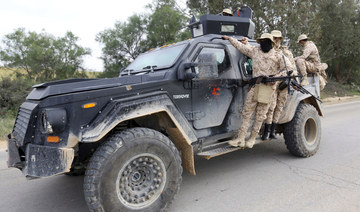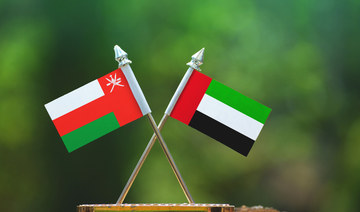DUBAI: Tensions between Yemen’s pro-secession Southern leadership and the internationally recognised government are easing now that a power-sharing deal has been signed, which halted clashes between the anti-Houthi coalition that had resurfaced decades of internal turmoil.
The new arrangement - signed in Saudi Arabia - calls for an equal number of ministries between each of the Southern Transitional Council (STC) and supporters of President Abd-Rabbu Mansour Hadi.
“The deal was obviously meant to defuse tensions between the STC and the Yemeni government, which is a welcome step,” Fatima Al-Asrar, a Yemen analyst at the Middle East Institute in Washington, told Arab News.
“But any deal reached on the south needs continuous dialogue ... to avoid the same scenario repeating itself.”

President Hadi (C-R) and STC member and former Aden governor Nasser Al-Khabji, sign documents during a peace-signing ceremony in capital Riyadh, Nov. 5, 2019. (AFP)
The negotiations began in August in the Saudi city of Jeddah after infighting threatened the unity of a coalition comprising STC forces and Hadi loyalists, which for years had been battling the Iran-allied Houthi militias.
The STC, representing secessionist southern interests and led by Aidarous Al-Zoubeidi, had opened a new front in Yemen’s multifaceted conflict when its elite military wing took control of Aden, where the government was based.
For a brief period, STC soldiers and Yemeni government troops clashed for control of Aden, leaving dozens dead and many more wounded.
The violence forced the government to return to Riyadh, in a setback reminiscent of its relocation to the Saudi capital in March 2015, around the time the coalition first intervened in a bid to halt a Houthi takeover.
The spark for the violence in Aden was a Houthi attack on a military parade in Aden on Aug. 1 that killed more than 30 STC soldiers.
Rightly or wrongly, some southerners felt that Hadi’s government had failed to share intelligence on Houthi threats.

The formation of the STC was first announced in May 2017 by Aidarous Al-Zoubeidi, a former governor of Aden. (AFP)
The formation of the STC was first announced in May 2017 by Al-Zoubeidi, a former governor of Aden.
A month earlier, fighting at Aden airport between the government and southern secessionists had prompted Hadi to dismiss Al-Zoubeidi.
Within a week, a mass rally opposing Hadi’s decision was organized by the Southern Movement, locally known as Al-Hirak, a coalition whose goal is political autonomy for Yemen’s south.
The STC’s attempt to seize power in Aden in August reflected the pent-up political aspirations of many southerners, who wanted the region to revert to its status as an autonomous, socially progressive entity.
The brief civil war of 1994 might have ended with a decisive victory for the northerners, but the outcome failed to stamp out separatist sentiments.
If anything, the ensuing years reinforced the conviction of many southerners that secession, not political reforms, was the solution to their problems.
However, southerners were not alone in their dissatisfaction with the political climate in Yemen. The uprising in 2011 was essentially a revolt against the authoritarian rule of Ali Abdullah Saleh, who was president for 33 years until he relinquished power in 2012 in the face of mounting public opposition.
 The mass rallies spoke to the frustrations of all Yemenis who did not live in Sanaa, a city where economic power and privileges was concentrated.
The mass rallies spoke to the frustrations of all Yemenis who did not live in Sanaa, a city where economic power and privileges was concentrated.
“The roots of this conflict are much more local, and they have a lot more to do with the political economy, struggles and frustrated regionalism,” Jane Kinninmont, Chatham House Middle East and North Africa Program head, said during a panel discussion in London on March 21.
“As in many countries, you’ve had an elite heavily concentrated in the capital who’ve traditionally benefited more from the country’s resources than pretty much anybody else. Grievances in all of Yemen’s regions, not only the south, have festered for a long time.”
Southerners in particular had complained of discrimination in economic opportunities and public services since Yemeni unification in 1990.
Saleh had forced thousands of southern civil servants and soldiers into early retirement, and appropriated nationalized agricultural land and property in the region.
He also restructured the southern administration as elite tribesmen started to project power across the region, while economic conditions in the south began to deteriorate.
Ali Salem Al-Beidh, vice president under Saleh, quit the Cabinet shortly after unification, claiming that the new government was systematically marginalizing southerners.
Southern frustrations with the post-unification situation led to the 1994 civil war. “When the unification deal was signed, the north didn’t really want an equal share of power or a true sense of unity. They just wanted their rule,” Nayef Ali Salem Al-Beidh, the son of Ali Salem Al-Beidh, told Arab News.

Former President Ali Abdallah Saleh (R) and former vice-president Ali Salim Al-Beidh on April 25, 1993, in Sanaa just before Al-Beidh returned to the South and claimed Saleh was systematically marginalizing southerners. (AFP)
The war ended with the defeat of the southern forces, driving many separatist leaders and activists into exile.
All hopes of secession quickly faded as Saleh consolidated his position as the leader of a unified Yemen.
Following the civil war, the number of southerners in government declined as Saleh formed a coalition with the Al-Islah party from 1994 to 1997.
“Unity between the north and south ended in 1994 when they (northern leaders) entered the south and occupied it,” said Nayef, who is currently based in the UAE.
In late 2001, a group called Sons of Southern and Eastern Provinces sent a letter to Saleh demanding a greater share of national wealth.
The increasing friction had other causes too. The geopolitical landscapes of northern and southern Yemen, shaped by different histories, have little in common.
Following the withdrawal of colonial power Britain, South Yemen became the People’s Democratic Republic of Yemen (PDRY).
From 1967 to 1990, it was ruled by the Yemeni Socialist Party, which adopted Marxist policies and maintained close ties with the Soviet Union and other communist states.
South Yemen nationalized key industries, limited property rights and granted women equal rights to men.
These policies were uncommon in the Arab world. Polygamous, child and forced marriages were outlawed, education was secularized, and Shariah law was replaced by a legal code.


By contrast, a succession of imams had ruled the north, or the Yemen Arab Republic, since 1918.
It became a republic after an Egypt-backed revolution in 1962. A civil war raged in the north from 1962 to 1970, drawing in a number of regional powers.
Saleh, who had served as president of North Yemen from 1978 to 1990, learned from the failures of five presidents, two of whom were assassinated.
He ruled the fractured country by cooperating with tribal leaders and sharing with them political and military power.
“The north is ruled by tribes,” Nayef said, underscoring what makes the north and south culturally different.
“The situation in Yemen is very complicated because there are many differences between the various political factions and regions.”

President Abdrabuh Mansur Hadi (C) gives a speech during the opening of a national dialogue conference in Sanaa on March 18, 2013. (AFP)
Nayef sees federal rule as the only viable solution to the current imbroglio. Federalization of Yemen was the recommendation of a National Dialogue Conference that took place in 2014, two years after Saleh was deposed.
Participants in that meeting agreed in principle on Yemen’s transformation into a six-region federal system.
However, the final outcome of the National Dialogue Conference did not address the demands of the separatists and the Houthi militias.
This resulted in strained relations between the various factions. The Houthi militias capitalized on the instability to seize Sanaa in 2014, and thereafter to extend their rule, dragging the country into a conflict that continues to this day.
Against this historical backdrop, the proposed equal division of ministries between the southern and northern provinces under the Riyadh Agreement augurs well not just for southerners, but for all Yemenis.





























